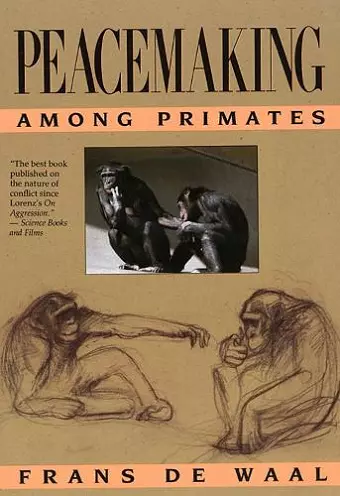Peacemaking among Primates
Format:Paperback
Publisher:Harvard University Press
Published:1st Oct '90
Currently unavailable, and unfortunately no date known when it will be back

Does biology condemn the human species to violence and war? Previous studies of animal behavior incline us to answer yes, but the message of this book is considerably more optimistic. Without denying our heritage of aggressive behavior, Frans de Waal describes powerful checks and balances in the makeup of our closest animal relatives, and in so doing he shows that to humans making peace is as natural as making war.
In this meticulously researched and absorbing account, we learn in detail how different types of simians cope with aggression, and how they make peace after fights. Chimpanzees, for instance, reconcile with a hug and a kiss, whereas rhesus monkeys groom the fur of former adversaries. By objectively examining the dynamics of primate social interactions, de Waal makes a convincing case that confrontation should not be viewed as a barrier to sociality but rather as an unavoidable element upon which social relationships can be built and strengthened through reconciliation.
The author examines five different species—chimpanzees, rhesus monkeys, stump-tailed monkeys, bonobos, and humans—and relates anecdotes, culled from exhaustive observations, that convey the intricacies and refinements of simian behavior. Each species utilizes its own unique peacemaking strategies. The bonobo, for example, is little known to science, and even less to the general public, but this rare ape maintains peace by means of sexual behavior divorced from reproductive functions; sex occurs in all possible combinations and positions whenever social tensions need to be resolved. “Make love, not war” could be the bonobo slogan.
De Waal’s demonstration of reconciliation in both monkeys and apes strongly supports his thesis that forgiveness and peacemaking are widespread among nonhuman primates—an aspect of primate societies that should stimulate much needed work on human conflict resolution.
The best book published on the nature of conflict since Lorenz’s On Aggression. * Science Books & Films *
De Waal’s message is simple yet profound… [He describes] in lucid and vivid prose the peacemaking strategies of four non-human primates he has studied in captivity… His analysis should prove compelling for any reader who has ever made up after a fight—in short, for anyone. -- Barbara Smuts * Natural History *
Probably the most clearly written, consistently and infectiously readable reporting of scientific research since T. H. Huxley popularized Darwin. * Booklist *
Lorenz sought to trace the origins of human aggressive impulses. Now, 20 years later, the Lorenzian mantle—considerably transformed—has slipped onto the shoulders of a young Dutch ethologist named Frans de Waal. Once again we have a keen observer who immerses himself in the social lives of other animals. Like Lorenz, de Waal is eager to let his thoughts range widely and speculatively in order to extract from comparisons of human beings with other animals take-home messages about global issues of peace and war. -- Sarah Blaffer Hrdy * New York Times Book Review *
Entertaining and exhaustively researched… Among the most perceptive and provocative of ethologists, [de Waal presents] persuasive evidence that the ruthless law of the jungle does not necessarily apply to humanity’s closest relatives. -- Peter Gorner * Chicago Tribune *
ISBN: 9780674659216
Dimensions: 235mm x 162mm x 19mm
Weight: 476g
310 pages